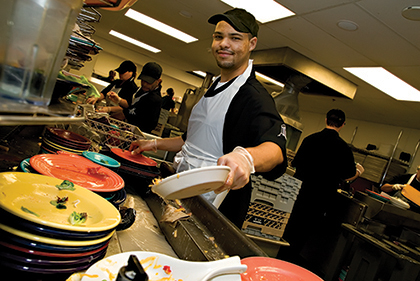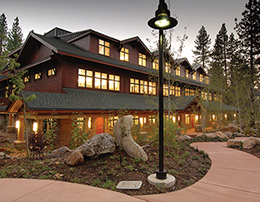
Project Compost collects more than 1,000 pounds of waste from UC Davis dining commons every day.
Campus aims for zero waste by 2020
Most people stop thinking about their food as soon as they leave the table, but for some administrators and students at UC Davis, the end of a meal is only the beginning.
Through Project Compost, they are collecting table scraps from the campus dining commons — some 1,000 pounds of organic matter every day — and turning it to compost to sell to local farmers. This student-run program is being done in conjunction with Sodexho, which manages campus dining services.
The effort — which has resulted in a total recycling rate of more than 90 percent — earned a Best Practice Award for innovative waste reduction at the UC, CSU and CCC Sustainability Conference, a gathering of representatives from California’s public higher education institutions, in Santa Barbara. And Project Compost organizers say this is just the beginning: They plan to expand the program to recycle organic wastes throughout campus.
UC Davis’ commitment to sustainable practices
— and its goal of becoming a zero-waste campus — has put it at the forefront of an environmental revolution among universities. At this year’s Convocation, Chancellor Larry Vanderhoef expressed his hope that, by 2020, the campus is reducing, reusing and recycling so effectively that nothing is sent to a landfill.
“If any campus can do it, we can,” he said. “We have a long tradition of environmental research and leadership and sustainable practices. But it won’t be easy. We certainly can’t succeed unless we do it together.”
2007 SUSTAINABILITY

Tahoe research center among ‘greenest’ buildings
The new home of the UC Davis Tahoe Environmental Research Center has been named one of only five science laboratories in the world to receive a Platinum LEED Certification from the U.S. Green Building Council. LEED stands for Leadership in Energy and Environmental Design. The building council recognizes several levels of energy- and environmental-design excellence; platinum is its highest award.
UC Davis debuts 2007 olive oil, wine vinegar; promotes eco-friendly lifestyle
UC Davis kicked off the 2007 line of its own, campus-produced olive oil and debuted a companion wine vinegar wit`h a launch party that highlighted sustainability. Campus roads are lined with more than 1,500 olive trees that required costly and constant cleanups, and their slippery residues were the cause of many bicycle accidents. After a particularly messy accident, Grounds Manager Sal Genito noticed that the scene had the unmistakable scent of olive oil, providing the inspiration for a way to save money and avoid lawsuits. He enlisted an olive oil expert to help devise a plan and these olives are now being pressed and blended into a marketable and award-winning product.
